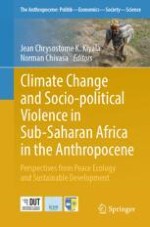2024 | OriginalPaper | Buchkapitel
15. Peace, Security and Sustainable Development Goals in Zimbabwe
verfasst von : Torque Mude
Erschienen in: Climate Change and Socio-political Violence in Sub-Saharan Africa in the Anthropocene
Verlag: Springer Nature Switzerland
Aktivieren Sie unsere intelligente Suche, um passende Fachinhalte oder Patente zu finden.
Wählen Sie Textabschnitte aus um mit Künstlicher Intelligenz passenden Patente zu finden. powered by
Markieren Sie Textabschnitte, um KI-gestützt weitere passende Inhalte zu finden. powered by
